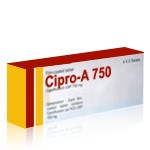Sinusitis Unplugged: Causes, Symptoms, and Smart Solutions


Sinusitis is a common and often debilitating condition that affects millions of people worldwide each year. Characterized by inflammation of the paranasal sinuses, this disorder can present in acute or chronic forms and lead to a range of symptoms that significantly reduce quality of life. While it is often dismissed as a seasonal annoyance, untreated or mismanaged sinusitis can contribute to serious complications. This article explores sinusitis in detail — including its causes, most severe symptoms, pregnancy-safe treatments, potential neck pain links, and the use of Cipro (ciprofloxacin) in treatment.
What Is Sinusitis?
Sinusitis refers to inflammation or swelling of the tissue lining the sinuses. The sinuses are air-filled cavities located in the forehead, cheeks, behind the nose, and between the eyes. Under normal conditions, they produce mucus that drains into the nose. When these pathways become blocked due to infection, allergies, or structural issues, the sinuses can fill with fluid and become a breeding ground for bacteria, viruses, or fungi — leading to an infection.
Sinusitis can be classified into:
- Acute sinusitis, which lasts less than four weeks.
- Subacute sinusitis, which persists for 4 to 12 weeks.
- Chronic sinusitis, lasting more than 12 weeks despite treatment.
- Recurrent sinusitis, where several episodes occur within a year.
What Is the Main Cause of Sinusitis?
The most common cause of sinusitis is a viral infection, such as the common cold. However, sinusitis can also result from bacterial infections, fungal infections, or non-infectious triggers like allergies or environmental irritants.
Structural issues like nasal polyps, a deviated septum, or enlarged turbinates can prevent proper sinus drainage and increase the risk of inflammation. Allergies, particularly allergic rhinitis, contribute significantly to sinus blockages. Air pollution, smoke, frequent upper respiratory infections, and even overuse of nasal decongestant sprays may also lead to or worsen sinusitis.
In people with immune system deficiencies or cystic fibrosis, the risk of developing chronic or complicated sinus infections is higher due to impaired mucociliary clearance.
What Are the Worst Symptoms of Sinusitis?
While some people may experience mild discomfort, others can suffer from severe symptoms that interfere with daily life. Among the worst symptoms of sinusitis are:
- Persistent facial pain and pressure, especially around the cheeks, eyes, or forehead. The pain often worsens when bending over or lying down.
- Severe nasal congestion and blockage, making it hard to breathe through the nose.
- Thick, discolored nasal discharge, often yellow or green, indicating bacterial involvement.
- Headaches, which can become intense and resemble migraines.
- Reduced or lost sense of smell and taste, which can be distressing and last long after the infection resolves.
- Dental pain, particularly in the upper teeth.
- Ear pain or pressure, caused by connected sinus pathways.
- High fever and chills, in cases of bacterial sinusitis.
- Fatigue, which is common in chronic sinusitis and contributes to the overall sense of illness.
- Sleep disturbances due to nasal obstruction and coughing, which may lead to daytime drowsiness and irritability.
These symptoms can lead to significant discomfort and may cause complications if the infection spreads to the eyes, brain, or bones.
How to Get Rid of Sinusitis When Pregnant?
Treating sinusitis during pregnancy requires caution to protect the health of both mother and baby. Since many over-the-counter medications and antibiotics are not considered safe during pregnancy, treatment focuses on non-pharmacological relief and doctor-approved medications.
Nasal saline irrigation is one of the safest and most effective options. It helps clear mucus and allergens from the nasal passages and is completely drug-free. Steam inhalation with essential oils like eucalyptus (in moderation) can relieve congestion. Hydration, rest, and using a humidifier are also helpful supportive measures.
For more severe symptoms, acetaminophen (paracetamol) may be used for pain and fever relief, as it is considered safe in pregnancy. If an infection is suspected, doctors may prescribe pregnancy-safe antibiotics, such as amoxicillin or cefuroxime, while avoiding drugs with potential risks like doxycycline or fluoroquinolones (e.g., ciprofloxacin).
Decongestants and antihistamines are generally avoided in the first trimester and only used under medical supervision thereafter. It’s crucial for pregnant individuals to consult an OB-GYN or primary care physician before starting any medication.
Can Sinuses Cause Neck Pain?
Though not widely recognized, sinusitis can indeed cause referred pain to the neck, especially when the infection or inflammation involves the sphenoid or ethmoid sinuses, which are located deeper in the skull near the base of the brain and spine. These sinuses can exert pressure on nearby nerves and muscles, leading to neck stiffness, soreness, or even radiating pain.
In cases where sinusitis becomes chronic or the infection spreads to adjacent tissues, it may cause muscle tension, poor sleep, and compensatory posture changes, all of which can contribute to neck pain. Additionally, headaches related to sinus pressure can extend down to the upper neck and shoulders, particularly if the person frequently tilts their head in an attempt to relieve sinus pressure.
While sinus-related neck pain is usually not severe, it can be uncomfortable and persistent. If neck pain is accompanied by high fever, neurological symptoms, or vision changes, it may suggest complications such as meningitis and requires immediate medical evaluation.
The Role of Cipro in the Treatment of Sinusitis
Ciprofloxacin, commonly known by its brand name Cipro, is a broad-spectrum antibiotic belonging to the fluoroquinolone class. It is effective against a variety of gram-positive and gram-negative bacteria and is sometimes used in the treatment of bacterial sinusitis, particularly in cases where first-line antibiotics have failed or are not appropriate.
Cipro is not typically the first drug of choice for sinusitis. Amoxicillin, amoxicillin-clavulanate, or doxycycline are more commonly prescribed. However, Cipro may be considered in complicated sinus infections, cases of resistant bacteria, or for patients with multiple drug allergies.
Despite its effectiveness, the use of ciprofloxacin must be approached with caution. The FDA has issued warnings about the risks associated with fluoroquinolones, including tendon rupture, nerve damage, psychiatric effects, and blood sugar disturbances. These side effects may be more pronounced in older adults or those with kidney disease.
Cipro is contraindicated in pregnant women, as fluoroquinolones have been linked to potential harm to fetal cartilage development. For this reason, it should not be used during pregnancy unless absolutely necessary and under strict medical supervision.
When used appropriately, Cipro can help eliminate severe or persistent infections and prevent complications like orbital cellulitis, abscess formation, or intracranial extension. Treatment duration typically ranges from 5 to 14 days, depending on the severity and response.
Prevention and Long-Term Management of Sinusitis
Preventing sinusitis largely revolves around minimizing exposure to allergens, pollutants, and infectious agents. Individuals prone to recurrent or chronic sinusitis may benefit from long-term nasal corticosteroids, allergy testing, and possibly immunotherapy.
In some cases, surgery may be required to correct structural abnormalities, remove nasal polyps, or widen sinus drainage pathways. Functional endoscopic sinus surgery (FESS) is a common and minimally invasive procedure used in chronic or refractory cases.
Maintaining good nasal hygiene, avoiding cigarette smoke, and managing underlying conditions like asthma or allergies can significantly reduce the risk of flare-ups.
Final Thoughts
Sinusitis is a multifactorial condition that ranges from a mild inconvenience to a source of chronic pain and disability. Understanding its underlying causes — whether viral, bacterial, allergic, or anatomical — is key to proper treatment and relief. The worst symptoms, including facial pain, congestion, headaches, and loss of smell, can take a heavy toll on daily life. For pregnant individuals, sinusitis requires especially careful management with safe, non-invasive remedies and medications. While it may surprise some, sinus-related inflammation can indeed cause neck pain due to referred pressure and muscular tension. As for treatment, ciprofloxacin plays a reserved but important role in select cases of bacterial sinusitis, but it comes with risks that must be carefully considered.
In managing sinusitis — whether acute or chronic — the goal is not only to relieve symptoms but to restore proper sinus function, prevent recurrence, and ensure long-term respiratory health. Early diagnosis, targeted therapy, and holistic care are the foundation of successful outcomes.
Drug Description Sources: U.S. National Library of Medicine, Drugs.com, WebMD, Mayo Clinic, RxList.
Reviewed and Referenced By:
Dr. Alan Carter, PharmD Clinical pharmacist specializing in respiratory infections and pharmacokinetics of antibiotics. Frequently cited on Drugs.com and Mayo Clinic for his analysis of fluoroquinolone safety.
Dr. Carol DerSarkissian, MD Board-certified internal medicine physician and medical reviewer at WebMD. Provides expert guidance on pregnancy-safe medications and respiratory tract infections.
Dr. Dianne B. McKay, MD Professor of Clinical Pharmacology, contributor to RxList. Her research focuses on antibiotic safety profiles and immune-mediated complications in sinusitis.
Dr. William C. Shiel Jr., MD, FACP, FACR Chief Editor at MedicineNet. Authored educational content on sinusitis pathophysiology and bacterial resistance trends.
(Updated at Sep 26 / 2025)

